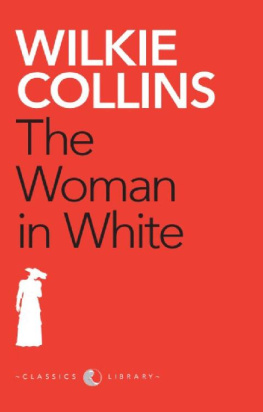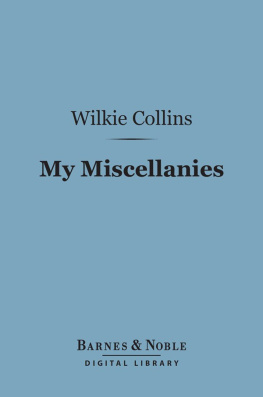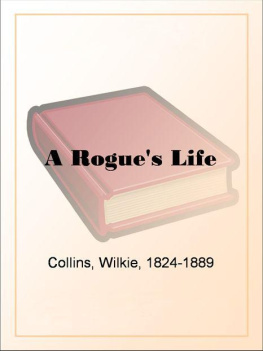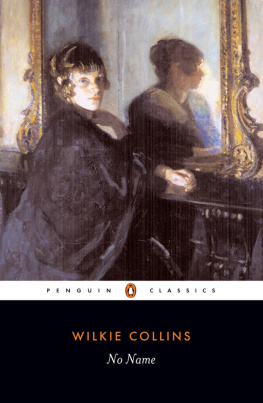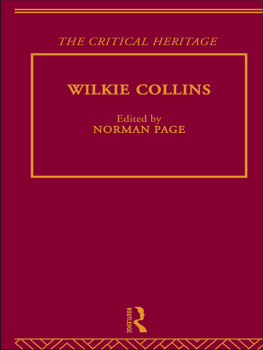Wilkie Collins - The Woman in White
Here you can read online Wilkie Collins - The Woman in White full text of the book (entire story) in english for free. Download pdf and epub, get meaning, cover and reviews about this ebook. year: 0, publisher: Classics Library, genre: Detective and thriller. Description of the work, (preface) as well as reviews are available. Best literature library LitArk.com created for fans of good reading and offers a wide selection of genres:
Romance novel
Science fiction
Adventure
Detective
Science
History
Home and family
Prose
Art
Politics
Computer
Non-fiction
Religion
Business
Children
Humor
Choose a favorite category and find really read worthwhile books. Enjoy immersion in the world of imagination, feel the emotions of the characters or learn something new for yourself, make an fascinating discovery.
- Book:The Woman in White
- Author:
- Publisher:Classics Library
- Genre:
- Year:0
- Rating:5 / 5
- Favourites:Add to favourites
- Your mark:
- 100
- 1
- 2
- 3
- 4
- 5
The Woman in White: summary, description and annotation
We offer to read an annotation, description, summary or preface (depends on what the author of the book "The Woman in White" wrote himself). If you haven't found the necessary information about the book — write in the comments, we will try to find it.
The Woman in White — read online for free the complete book (whole text) full work
Below is the text of the book, divided by pages. System saving the place of the last page read, allows you to conveniently read the book "The Woman in White" online for free, without having to search again every time where you left off. Put a bookmark, and you can go to the page where you finished reading at any time.
Font size:
Interval:
Bookmark:
~ Biographical Note ~
B orn on 8 January 1824, William Collins, one of the most prolific writers of the Victorian era and the father of modern detective fiction, was the son of William Thomas Collins, a well-known landscape artist. Although named after his father, he was better known by his second name, a tribute to his godfather, David Wilkie.
Both Collins and his brother were primarily homeschooled, although Collins attended Mr. Coles boarding school in Highbury for a brief period. Here, he took to story-telling as a means of entertaining older boys in order to avoid their bullying. His knowledge of French and Italian, picked up while travelling with his family in Europe, also set him apart. Later, he studied law at Lincolns Inn and although he never formally practiced, he used his legal knowledge in many of his works.
In 1851, while acting in an amateur theatre production, Collins was introduced to Charles Dickens, who eventually became his lifelong friend. Collins began writing for Dickenss journal, Household Words and was supported and encouraged by Dickens, twelve years his senior. In 1857, Collins wrote his most famous play, The Frozen Deep, which Dickens acted in.
Collins lived a life that defied the norms of Victorian propriety. In 1856, he began living with widow Caroline Elizabeth Graves, and her daughter Harriet. In 1864, while on a visit to Norfolk, he met and began an affair with Martha Rudd, a nineteen year old from an impoverished family. For several years, Collins maintained separate households with Caroline and Martha, assuming the name of William Dawson when he was with Martha. His three children with Martha, two girls and a boy, bore the name of Dawson.
Collinss most popular work The Woman in White, published in 1859, was phenomenally successful, bringing together themes of mystery, madness and murder. The Moonstone followed in 1868, which remains his most critically acclaimed work. However following his success in the 1860s, Collinss career suffered a decline, particularly because of his increased dependence on laudanum, to which he was addicted.
Collins died on 23 September 1889 at his home in Wimpole Street, London.
The Woman in White
By Wilkie Collins

First published in 2012 by
Rupa Publications India Pvt. Ltd.
7/16, Ansari Road, Daryaganj
New Delhi 110002
Edition copyright Rupa Publications India Pvt. Ltd. 2012
All rights reserved.
No part of this publication may be reproduced, transmitted, or stored in a retrieval system, in any form or by any means, electronic, mechanical, photocopying, recording or otherwise, without the prior permission of the publisher.
ISBN: 978-81-291-2036-6
10 9 8 7 6 5 4 3 2 1
This book is sold subject to the condition that it shall not, by way of trade or otherwise, be lent, resold, hired out, or otherwise circulated, without the publishers prior consent, in any form of binding or cover other than that in which it is published.
Contents
The First Epoch
The Story Begun By Walter Hartright
(of Clement's Inn, Teacher of Drawing)
T his is the story of what a Woman's patience can endure, and what a Man's resolution can achieve.
If the machinery of the Law could be depended on to fathom every case of suspicion, and to conduct every process of inquiry, with moderate assistance only from the lubricating influences of oil of gold, the events which fill these pages might have claimed their share of the public attention in a Court of Justice.
But the Law is still, in certain inevitable cases, the pre-engaged servant of the long purse; and the story is left to be told, for the first time, in this place. As the Judge might once have heard it, so the Reader shall hear it now. No circumstance of importance, from the beginning to the end of the disclosure, shall be related on hearsay evidence. When the writer of these introductory lines (Walter Hartright by name) happens to be more closely connected than others with the incidents to be recorded, he will describe them in his own person. When his experience fails, he will retire from the position of narrator; and his task will be continued, from the point at which he has left it off, by other persons who can speak to the circumstances under notice from their own knowledge, just as clearly and positively as he has spoken before them.
Thus, the story here presented will be told by more than one pen, as the story of an offence against the laws is told in Court by more than one witnesswith the same object, in both cases, to present the truth always in its most direct and most intelligible aspect; and to trace the course of one complete series of events, by making the persons who have been most closely connected with them, at each successive stage, relate their own experience, word for word.
Let Walter Hartright, teacher of drawing, aged twenty-eight years, be heard first.
~ II ~
It was the last day of July. The long hot summer was drawing to a close; and we, the weary pilgrims of the London pavement, were beginning to think of the cloud-shadows on the corn-fields, and the autumn breezes on the sea-shore.
For my own poor part, the fading summer left me out of health, out of spirits, and, if the truth must be told, out of money as well. During the past year I had not managed my professional resources as carefully as usual; and my extravagance now limited me to the prospect of spending the autumn economically between my mothers cottage at Hampstead and my own chambers in town.
The evening, I remember, was still and cloudy; the London air was at its heaviest; the distant hum of the street-traffic was at its faintest; the small pulse of the life within me, and the great heart of the city around me, seemed to be sinking in unison, languidly and more languidly, with the sinking sun. I roused myself from the book which I was dreaming over rather than reading, and left my chambers to meet the cool night air in the suburbs. It was one of the two evenings in every week which I was accustomed to spend with my mother and my sister. So I turned my steps northward in the direction of Hampstead.
Events which I have yet to relate make it necessary to mention in this place that my father had been dead some years at the period of which I am now writing; and that my sister Sarah and I were the sole survivors of a family of five children. My father was a drawing-master before me. His exertions had made him highly successful in his profession; and his affectionate anxiety to provide for the future of those who were dependent on his labours had impelled him, from the time of his marriage, to devote to the insuring of his life a much larger portion of his income than most men consider it necessary to set aside for that purpose. Thanks to his admirable prudence and self-denial my mother and sister were left, after his death, as independent of the world as they had been during his lifetime. I succeeded to his connection, and had every reason to feel grateful for the prospect that awaited me at my starting in life.
The quiet twilight was still trembling on the topmost ridges of the heath; and the view of London below me had sunk into a black gulf in the shadow of the cloudy night, when I stood before the gate of my mothers cottage. I had hardly rung the bell before the house door was opened violently; my worthy Italian friend, Professor Pesca, appeared in the servants place; and darted out joyously to receive me, with a shrill foreign parody on an English cheer.
On his own account, and, I must be allowed to add, on mine also, the Professor merits the honour of a formal introduction. Accident has made him the starting-point of the strange family story which it is the purpose of these pages to unfold.
Next pageFont size:
Interval:
Bookmark:
Similar books «The Woman in White»
Look at similar books to The Woman in White. We have selected literature similar in name and meaning in the hope of providing readers with more options to find new, interesting, not yet read works.
Discussion, reviews of the book The Woman in White and just readers' own opinions. Leave your comments, write what you think about the work, its meaning or the main characters. Specify what exactly you liked and what you didn't like, and why you think so.

